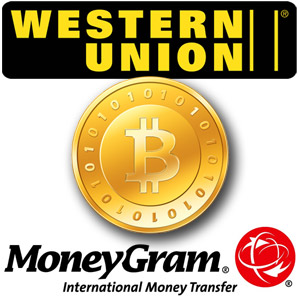 NEWS
NEWS
 NEWS
NEWS
 NEWS
NEWS
![]() The popularity of the best-working Internet cryptocurrency in history is continuing to soar and this has brought attention to major money transmitters such as Western Union and MoneyGram. The usual economic place that both companies is to permit people to transfer sums of money across distances—be they across the US or between countries—and at the same time allow for an exchange between local currencies, so that customers could send USD to family in Japan and have the money changed to yen.
The popularity of the best-working Internet cryptocurrency in history is continuing to soar and this has brought attention to major money transmitters such as Western Union and MoneyGram. The usual economic place that both companies is to permit people to transfer sums of money across distances—be they across the US or between countries—and at the same time allow for an exchange between local currencies, so that customers could send USD to family in Japan and have the money changed to yen.
In a recent article at Fox News Business, Andrew R. Johnson notes that the rise of bitcoin is garnering attention from these companies:
“If bitcoin continues to grow and the value is defined more internationally, we may find an opportunity for bitcoin to be used to pay for commerce transactions through a Western Union business solution,” said David Thompson, an executive vice president and chief information officer of Western Union.
Over at MoneyGram, senior vice president of U.S. and Canada Peter Ohser said, “We’ve been contacted by folks who are doing various things in this space to see if there’s opportunities for us to help enable greater functionality for some of these [bitcoin companies] but we’ve not committed and don’t have any imminent plans to announce anything.”
While the representatives of both companies seem a bit cagey on the subject, it’s still extremely telling about the attention and adulation that bitcoin is receiving to have them quoted on the subject at all.
The rise in popularity of the cryptocurrency produces an interesting market that both Western Union and MoneyGroup could take advantage of should they choose to. As facilitators of remittance of funds across the world, they’re in the business of making sure that people get money when they need it—and the part where they exchange foreign currency for local currency puts them in a fairly good position to be part of the bitcoin economy.
Not as transmitters of bitcoin but as end-point exchanges
The best-possible paradigm that both Western Union and MoneyGram have for entering into the Bitcoin market isn’t to be part of people transferring bitcoins between one another (the very basic underlying protocol behind Bitcoin already does this) but the niche they could fill is that of an exchange. People who want to change bitcoins between whatever fiat currency of their locality could use an easy-to-reach method of doing that.
Right now, this niche is held by companies such as BitInstant or facilitated by websites like LocalBitcoins.com. Trading in bitcoins is fairly easy when there are people to make the exchanges but getting in right now is somewhat difficult due to the niche market that it represents.
With the ever-increasing notice of the popular media, noted by NPR and a mention on the Colbert Report recently, the desire for people to become part of the market is going to increase and with it there will be a greater opportunity for anyone exchanging bitcoins for USD, EURO, etc. to provide a valuable service.
Furthermore, having easier entrance and exit from the bitcoin currency network to-and-from local fiat will more than likely promote a more stable exchange rate by increasing the volume of participants. Right now, sheer volatility and niche status of the cryptocurrency tend to work against it for being used in everyday transactions—the ultimate expectation of many people looking to the future of bitcoins.
And the addition of numerous ways for even everyday customers and merchants to participate will have a normalizing effect that would add yet another milestone to pulling bitcoins out of their apparent niche economy.
Support our mission to keep content open and free by engaging with theCUBE community. Join theCUBE’s Alumni Trust Network, where technology leaders connect, share intelligence and create opportunities.
Founded by tech visionaries John Furrier and Dave Vellante, SiliconANGLE Media has built a dynamic ecosystem of industry-leading digital media brands that reach 15+ million elite tech professionals. Our new proprietary theCUBE AI Video Cloud is breaking ground in audience interaction, leveraging theCUBEai.com neural network to help technology companies make data-driven decisions and stay at the forefront of industry conversations.